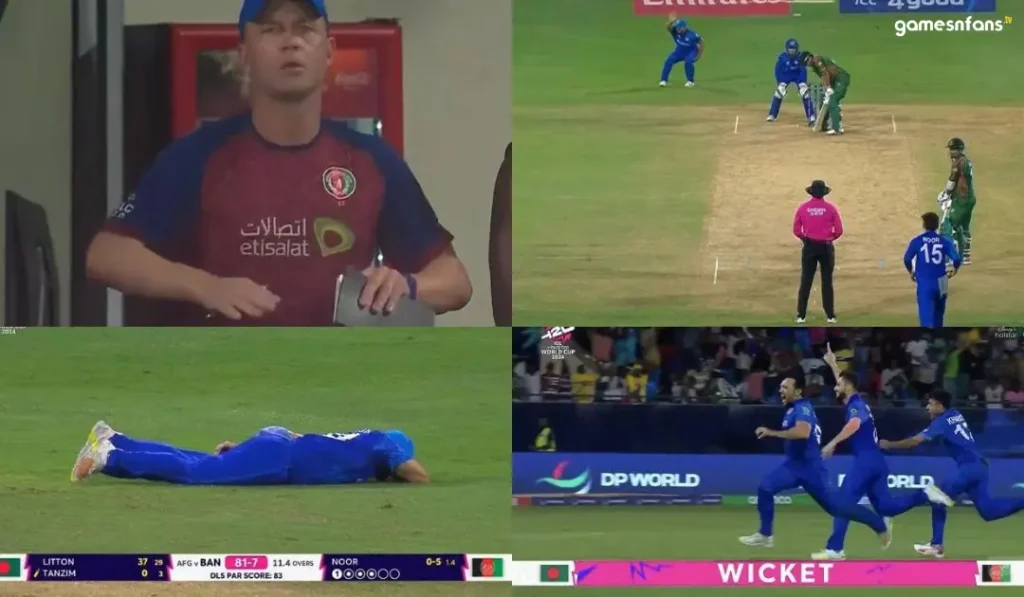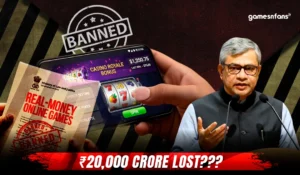Gulbadin Cheating:Will ICC Punish Afganistani Star?

During Tuesday’s last Super Eight match of the 2024 T20 World Cup versus Bangladesh at the Arnos Vale Ground in Kingstown, St. Vincent, Afghanistan’s all-rounder Gulbadin Naib ignited a significant controversy. Cricket talks were sparked by Gulbadin’s apparent episode of cramps, which led to accusations of cheating during the match.
In the rain-affected see-saw match, it occurred in the twelfth over of the second innings when Bangladesh trailed the DLS par score by only three runs after Noor Ahmad produced three straight dot balls. During the over, there was a slight rain, and Jonathan Trott, the head coach of Afghanistan and a former cricketer for England, motioned to the players to “slow down” by pointing up at the sky. Gulbadin was standing motionless at the slide when he suddenly collapsed, holding his hamstring due to a cramp.
Gulbadin’s actions criticized by People
Rashid Khan, the captain of Afghanistan, was not pleased with what the pundits called a “time-wasting” tactic, but with to Gulbadin’s efforts, it did succeed in stopping the bowling of deliveries while covering. Afghanistan, who were in a difficult situation in the chase after Bangladeshi opener Litton Das scored a valiant half-century, would have won on DLS if the rest of the match had beenhed out.
Read More: Afghanistan Knocked out Australia’s Hopes of Semi Finals
But in an unexpected change of events, the covers were removed in a matter of minutes, Gulbadin returned to the field, and he took a crucial wicket before Naveen-ul-Haq took the last two wickets to enable Afghanistan win thrillingly by eight runs.
Gulbadin Naib was struggling to walk at 10.01am.
— Mufaddal Vohra (@mufaddal_vohra) June 25, 2024
– He was running the fastest at 10.34am when Afghanistan won. 😂❤️ pic.twitter.com/KRv3mOyU9O
Gulbadin’s actions were scrutinized on social media shortly after the victory, particularly after the all-round player was shown celebrating Afghanistan’s first-ever ICC tournament semifinal appearance by running about crazily. After the game, Rashid clarified the situation by stating, “He [Naib] had some cramp.” It doesn’t matter that I don’t know what happened to him or what’s happening on social media. It didn’t significantly alter the course of the game. After five minutes, we returned to the field, and nothing had changed significantly.”
What ICC Rules Says?
As to the ICC Playing Conditions for the 2024 T20 World Cup, section 41, “The umpires will be the exclusive arbiters of fair and unfair play.” When it is apparent that calling a call won’t hurt the side that isn’t offending, any umpire who feels that a player’s action that isn’t covered by these rules is unjust should call and indicate Dead bal, if applicable, and report the issue to the other umpire.

The bowler’s end umpire will then call the offending player’s captain and give a first and final warning that will be valid for all players on the team for the duration of the match if this is the offending team’s first offense. Additionally, inform the captain of the guilty player that the other side will receive five penalty runs if any other members of the squad commit the same offense.”
Therefore, even if Gulbadin’s charges were validated, the on-field umpires’ only choice was to penalize Afghanistan five runs, but that option was not available at that particular point in the game.
Section 4.9
Additionally, section 4.9 of the tournament’s playing conditions, which deals with “Time wasting by a fileding side,” states that “If either umpire believes that an over is progressing too slowly or that time is being wasted in any other way by the fielding side captain or by any other fielder, the umpire in question shall, at the first instance, call and given dead ball if the ball is in play. Tell the opposing umpire what happened. The fielding side captain will then receive a warning from the bowler’s end umpire, stating that this is the first and only warning. Tell the batters what has happened.”

In the meanwhile, Gulbadin’s time-wasting behavior may be considered a Level One or Level Two offense under the ICC Code of Conduct, for which the governing body may impose two suspension points or a heavy punishment equal to 100% of the match fees. It now relies on whether the on-field match officials notify the match referee that the event was a waste of time.




